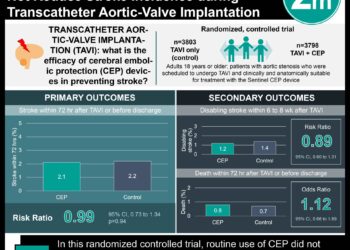Chlorthalidone is not superior to hydrochlorothiazide in preventing hypertension-related cardiovascular events
1. Patients with hypertension who received chlorthalidone did not have a lower occurrence of adverse cardiovascular outcomes compared to patients who received hydrochlorothiazide.
2. Patients who received chlorthalidone did not have a lower occurrence of non-cancer-related deaths than patients who received hydrochlorothiazide.
Evidence Rating Level: 1 (Excellent)
Study Rundown: Thiazide diuretics are often first-line antihypertensive agents used to prevent adverse cardiovascular outcomes in patients with hypertension. Early studies have suggested that chlorthalidone is superior to hydrochlorothiazide in patients with hypertension. Though, recent studies have shown similar efficacy between the two medications. However, there is a gap in knowledge as to understanding whether chlorthalidone, as compared with hydrochlorothiazide reduces the risk of major cardiovascular disease outcomes and non–cancer-related deaths in older patients with hypertension who were receiving hydrochlorothiazide at baseline. Overall, this study found that chlorthalidone did not lead to a lower incidence of major cardiovascular outcomes or non–cancer-related deaths than hydrochlorothiazide in patients with hypertension at doses commonly used in clinical practice. This study was limited by being open-label, which included patients who were assigned to the chlorthalidone group that switched back to hydrochlorothiazide. Nevertheless, these study’s findings are significant, as they demonstrate that chlorthalidone is not superior to hydrochlorothiazide in lowering major cardiovascular outcomes or non-cancer-related deaths in patients with hypertension.
Click to read the study in NEJM
Relevant Reading: Thiazide-like versus Thiazide Diuretics — Finally, an Answer?
In-Depth [pragmatic open-label trial]: This multicenter, pragmatic, open-label trial was conducted by the Department of Veteran Affairs healthcare system. Patients who were at least 65 years of age and had hypertension and an active prescription for hydrochlorothiazide at a dose of 25 or 50mg per day were eligible for the study. Patients who were taking blood-pressure medication that contained hydrochlorothiazide combined with other agents were excluded from the study. The primary outcome measured was the first occurrence of a composite outcome consisting of a nonfatal cardiovascular disease event or non–cancer-related death, assessed in a time-to-event analysis. Nonfatal cardiovascular disease events were nonfatal myocardial infarction, stroke, hospitalization for heart failure, or urgent coronary revascularization for unstable angina. Outcomes of the primary analysis were assessed via unadjusted log-rank tests that were stratified according to the Veteran Affairs healthcare system. Based on the primary analysis, with a median follow-up of 2.4 years, there was little difference in the occurrence of primary-outcome events between the chlorthalidone group (702 patients [10.4%]) and the hydrochlorothiazide group (675 patients [10.0%]) (hazard ratio, 1.04; 95% confidence interval, 0.94 to 1.16). There were no between-group differences in the occurrence of any of the components of the primary outcome. The incidence of hypokalemia was higher in the chlorthalidone group than in the hydrochlorothiazide group (6.0% vs. 4.4%; p<0.001). Overall, this study demonstrates that patients receiving chlorthalidone did not have a lower occurrence of major cardiovascular outcome events or non-cancer-related deaths than patients receiving hydrochlorothiazide.
Image: PD
©2023 2 Minute Medicine, Inc. All rights reserved. No works may be reproduced without expressed written consent from 2 Minute Medicine, Inc. Inquire about licensing here. No article should be construed as medical advice and is not intended as such by the authors or by 2 Minute Medicine, Inc.







